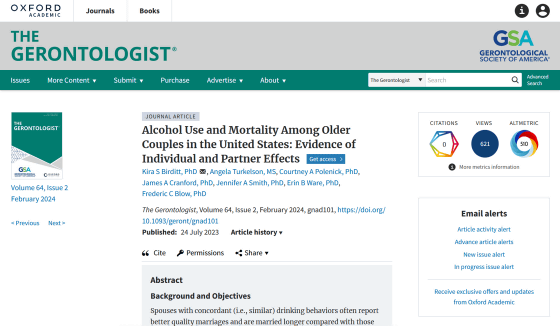Research shows that couples with similar drinking habits live longer than those without

Recent research has shown that even moderate drinking can
Alcohol Use and Mortality Among Older Couples in the United States: Evidence of Individual and Partner Effects | The Gerontologist | Oxford Academic
https://academic.oup.com/gerontologist/article-abstract/64/2/gnad101/7230161

Couples with similar drinking habits may live longer | University of Michigan News
https://news.umich.edu/couples-with-similar-drinking-habits-may-live-longer/
Couples with 'drinking partnership' may live longer | BPS
https://www.bps.org.uk/research-digest/couples-drinking-partnership-may-live-longer
The concept of ' drinking partnerships ,' first proposed in a 1998 paper , suggests that a couple's drinking habits may affect their relationship. Previous research has suggested that couples in which one spouse drinks more heavily than the other tend to experience more conflict and distress, while couples with similar drinking habits tend to experience less conflict and stay married longer.
However, the health effects of married couples' drinking patterns have not been well studied, so a research team led by University of Michigan researcher Kira Burditt investigated whether the drinking habits of married couples and cohabiting couples are associated with mortality rates.
The study used data from the Health and Retirement study (HRS), conducted by the University of Michigan's Institute for Social Research. The HRS interviews about 20,000 American adults aged 50 and older every two years about topics such as health care, housing, assets, employment, and disability.
The research team's analysis included 4,656 married or cohabiting couples (9,312 individuals) who completed the HRS interview at least three times between 1996 and 2016. These subjects answered questions such as whether they had drunk alcohol in the past three months, and if so, how many days a week and how many drinks they had had. The research team also looked at whether the subjects had died.

The analysis showed that the percentage of husbands or men who answered that they had drunk alcohol in the past three months was nearly 60% and the percentage of wives or women was just under 50%. In addition, when examining the drinking habits and mortality rates of couples, it was found that the mortality risk of 'couples in which both partners drank alcohol in the past three months' was lower than that of 'couples in which neither partner drank alcohol' or 'couples in which only one partner drank alcohol.'
'Interestingly, we found that couples in which both partners reported drinking alcohol in the past three months lived longer than couples in which neither partner reported drinking alcohol and couples in which one partner drank and the other did not,' said Burditt.
The study also found that couples who drank light or moderate amounts of alcohol were less likely to die than those who drank too much or nothing at all.

Looking at the results of this study, it's tempting to think that drinking more with your partner would be better for your health. However, because it's unclear why matching drinking habits is associated with lower mortality rates, Burditt cautions against jumping to conclusions.
The researchers noted that the consistency of drinking habits between couples could reflect factors such as each other's lifestyles, intimacy, and relationship satisfaction. 'Other studies have shown that couples who drink together tend to have better relationship quality,' said Birditt. 'This may be because drinking together increases intimacy between partners.'
Birditt argued that further research into the relationship between drinking and partners is needed to more accurately understand the impact of couples' drinking habits on their health.
Related Posts:
in Posted by log1h_ik







